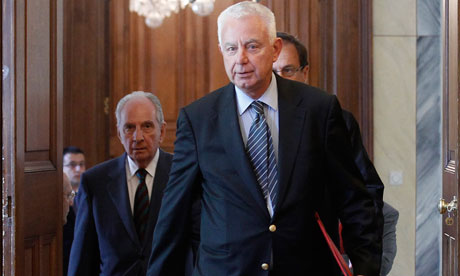Helena Smith in Athens guardian.co.uk, Wednesday 16 May 2012 21.14 BST
Judge Panagiotis Pikramenos heads administration until 17 June elections as concerns mount over Greece's ability to stay in euro
The new Greek caretaker prime minister Panagiotis Pikramenos arrives at the presidential palace in Athens. Photograph: John Kolesidis/AP
A caretaker government led by a high-court judge took charge of Greece on Wednesday – 10 days after it was plunged into chaos by an inconclusive poll – with the express aim of steering it to fresh elections.
The interim administration was sworn in amid heightened fears over Athens' ability to remain in the euro. The president, Karolos Papoulias, warned this week of "fear that could develop into panic" as Greek banks were drained of deposits.
"Thank you for your trust," the country's new prime minister, Panagiotis Pikramenos, said as he met Papoulias. "This is purely a caretaker government, but it escapes no one that our country is going through difficult times. We must safeguard its prestige and ensure a smooth transition."
The 67-year-old judge, who replaces Lucas Papademos, the former central banker who has been in charge of an emergency left-right coalition government for the past six months, will hold the reins of power until 17 June, when Greeks return to the ballot box. With debt-stricken Athens reliant on rescue loans from the EU and IMF, the vote's outcome will determine whether the country remains in the euro.
Before the electoral campaign has officially begun, battle lines have been drawn between those who believe the punishing austerity cuts are a price worth paying, and those who want the "barbaric" EU-mandated measures revoked. Fury over successive waves of belt-tightening – blamed for unprecedented levels of unemployment and poverty – prompted nearly 70% of Greeks to vote for anti-bailout parties on 6 May.
"It promises to be a very tense, very bitter electoral campaign," said political commentator Nikos Evangelatos. "All parties want the terms to be revised."
The battle has dramatically reconfigured Greece's political scene. On one side are Pasok and New Democracy, formerly mainstream forces whose support base was shattered at the last election as they were blamed for enforcing draconian spending cuts. Although long-time rivals on the left and right of the political spectrum, they are now referred to as centrist and pro-European.
On the other side lies an array of anti-austerity groups lead by Syriza, a leftwing alliance of radicals whose popularity has rocketed, fuelled by anger over cuts.
Successive polls have shown Syriza, the surprise runner up in the last elections, consolidating its gains.
Alexis Tsipras, the former student radical who leads the party, has called the latest €130bn rescue plan "barbaric" and "an agreement of poverty and wretchedness". On the eve of the 6 May poll, he told the Guardian that the German chancellor Angela Merkel "should worry" if Syriza ever came to power. "We don't want to leave the euro but we want to cancel the accord which denies people basic rights and is totally unfair," he said.
On Tuesday, following the collapse of last-ditch negotiations to form a national unity government to navigate Greece through to European elections in 2014, Tsipras claimed that the EU, led by Berlin, was engaged in a high-stakes game of bluff. The threat to "accept more austerity or exit the eurozone" would never happen because the eurozone itself had far too much to lose.
"[Jean-Claude] Junker said it himself," he said referring to statements made by the euro group chairman this week. "There is no question of Greece ever leaving [the bloc]."
His opponents brand Tsipras naive, a politician with a schoolboy knowledge of economics who gained power on the strength of false promises to Greeks.
"But there is no doubt that the left has the momentum, the upper hand," said Dimitris Keridis, a political scientist at Panteion University in Athens. "It has capitalised on the anti-austerity argument, unlike the pro-European forces which should have made it much clearer what was at stake," he said. "This time round they have to be much more focused in making the argument that it might be bad now but it will be much, much worse if Greece leaves the euro."
On Wednesday, the outgoing finance minister, Filippos Sachinidis, said the stakes were higher than they had ever been. Greeks were faced with a choice and either way it would not be easy.
"The [June] election will decide whether we Greeks want to be in the euro zone," he said in a radio interview. "When there are political forces that are saying it won't be so bad to return to the drachma, it is the equivalent of saying we should leave the eurozone.
"It is our choice, our decision, but if we do that [reject the single currency] we will go back decades. All our achievements will be wiped out and it will happen in such a violent way I don't know if we will be able to continue functioning as a modern democracy."
Greece's interim government sworn in before fresh election | World news | The Guardian
![The [Greek] European Tragedy](https://blogger.googleusercontent.com/img/b/R29vZ2xl/AVvXsEiWKI5s90SFm1wWTk6bs4p7CgslaC2SnYPsrZhb-B-smOufNNCSxCvpBLI9hOB-LsXZjir_PNmEiMk2-E62F3xkg96IoC6QFAaZAnPRTVH340IN9WBRmWJqPkjWlgyRj3zpALp7h6hvA58/s920/GkBack_new.jpg)
